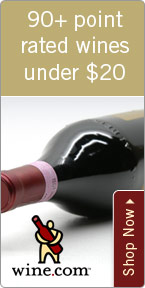2007: A Good Year For Wine

Wednesday - January 05, 2007
| Share
 Del.icio.us
Del.icio.usHappy New Year! It’s a fresh new year and I have wonderful expectations and hopes for the wine world. I’ve looked into my crystal wine glass and have materialized several predictions for 2007. I wouldn’t bet the house on it, but maybe a bottle of wine.
1) Pinot Noir will continue to grow in popularity. It’s not just a fad. There is genuinely good-tasting and easy-drinking Pinot Noir to be found from many pockets around the world. California will continue to lead the pack in growth, especially from the Central (i.e. Santa Rita Hills) and Sonoma coasts with New Zealand and Oregon filling in nicely.
Burgundy, which still has its unwavering followers and fanatics, will be bridged by many a Pinot Noir fan due to the stylistic wave of more fruity wines, better winemaking practices and technology used in the Old World. Warmer vintages will also make it easier for Burgundians to find admirers around the world.
Unfortunately in conjunction with this popularity, the better Pinot Noirs from everywhere will also increase in price. Intrinsic in making great Pinot Noir wine is lowering yields. Lowering yields makes for less wine, thus higher prices. Demand is already pushing the price graph for Pinot Noir grapes upward. It’s onward and upward for Pinot Noir, my favorite grape.
2) There will be more producers using or experimenting with organic or biodynamic farming practices. This is not only because they are concerned for the environment, but because once a winemaker realizes that there is only so much that can be done in the winery, he must look to the vineyard. One can’t make great wine without great grapes. And if the vine grower has done everything he can to grow the best grapes, but still thinks he can get even better, he will turn to organic or biodynamic farming practices to see if using it will result in better grapes. Not all will, but certainly more. Obviously it’s not the singular reason for great wines, but it’s worth keeping an eye on.
3) Fewer people will age their wine - both consumers and winemakers. In today’s age of immediate gratification, people are no longer willing to wait for their wines to reach their “peaks.” Winemakers are releasing their wines sooner in general as well, taking advantage of the fact that people can appreciate it young and fruity, immediately, more easily than an aged, refined and complex product. Bordeaux is a perfect example, with the wines being so much easier to drink early instead of waiting the prerequisite number of years before they “open up.” I see consumers drinking up the 2000 and 2003 vintage Bordeaux long before the wines’ fifth birthdays.
Even the closure debate has a part in this as more and more wines are screw-capped because they are made for “immediate consumption.” Why is it such a big deal? This phenomenon will drive the auction market for older wines and classics to even higher levels. The rarity and demand of older wines will only increase among collectors and drinkers alike simply because of their short supply. In addition, it fuels the movement of wine-makers to produce wines in a style made for young drinking instead of a wine that can stand the test of time. Wines don’t necessarily have to age, but it indicates the market consumers’ tastes, and for me, it’s too young.
4) Old World countries like France, Italy and Spain will go varietal. They will either add grape names to their labels or will start to bottle wines that are made with single varietals in order to compete with the New World. Instead of seeing just Margaux, Barolo or Rioja on the label, you will also see the grape names too, if not on the front label, at least on the back label. It will make it easier for us to buy, period.
I’ll be looking out for the best of 2007 for you, so stay tuned.
New release recommendations:
2001 Betts & Scholl Hermitage ($60) is a terrific example of the heights that Syrah can reach in such masterful hands as Jean Louis Chave’s.
2005 Layer Cake Shiraz ($15) Really fun and juicy, it’s a gogo dancer of a wine that dances all over your palate.
Roberto Viernes is a master sommelier. E-mail .(JavaScript must be enabled to view this email address)E-mail this story | Print this page | Comments (0) | Archive | RSS Comments (0) |
Most Recent Comment(s):












